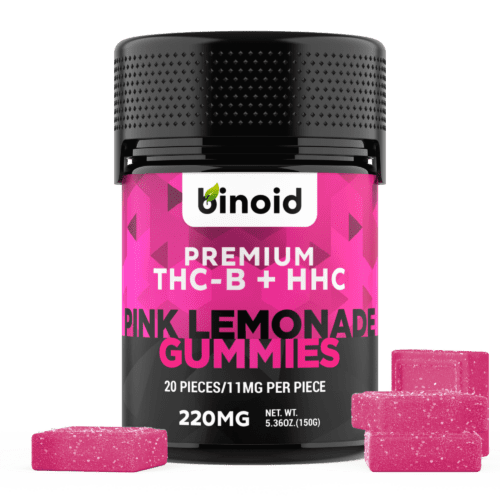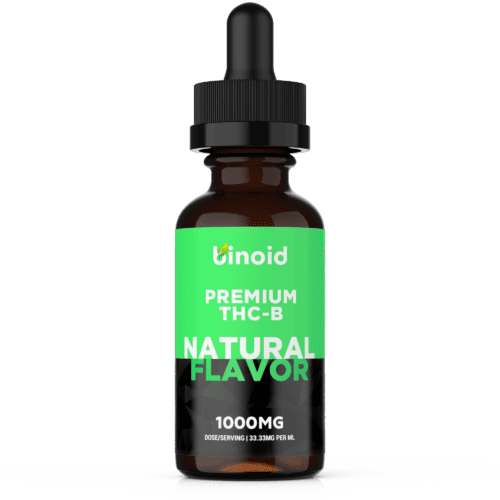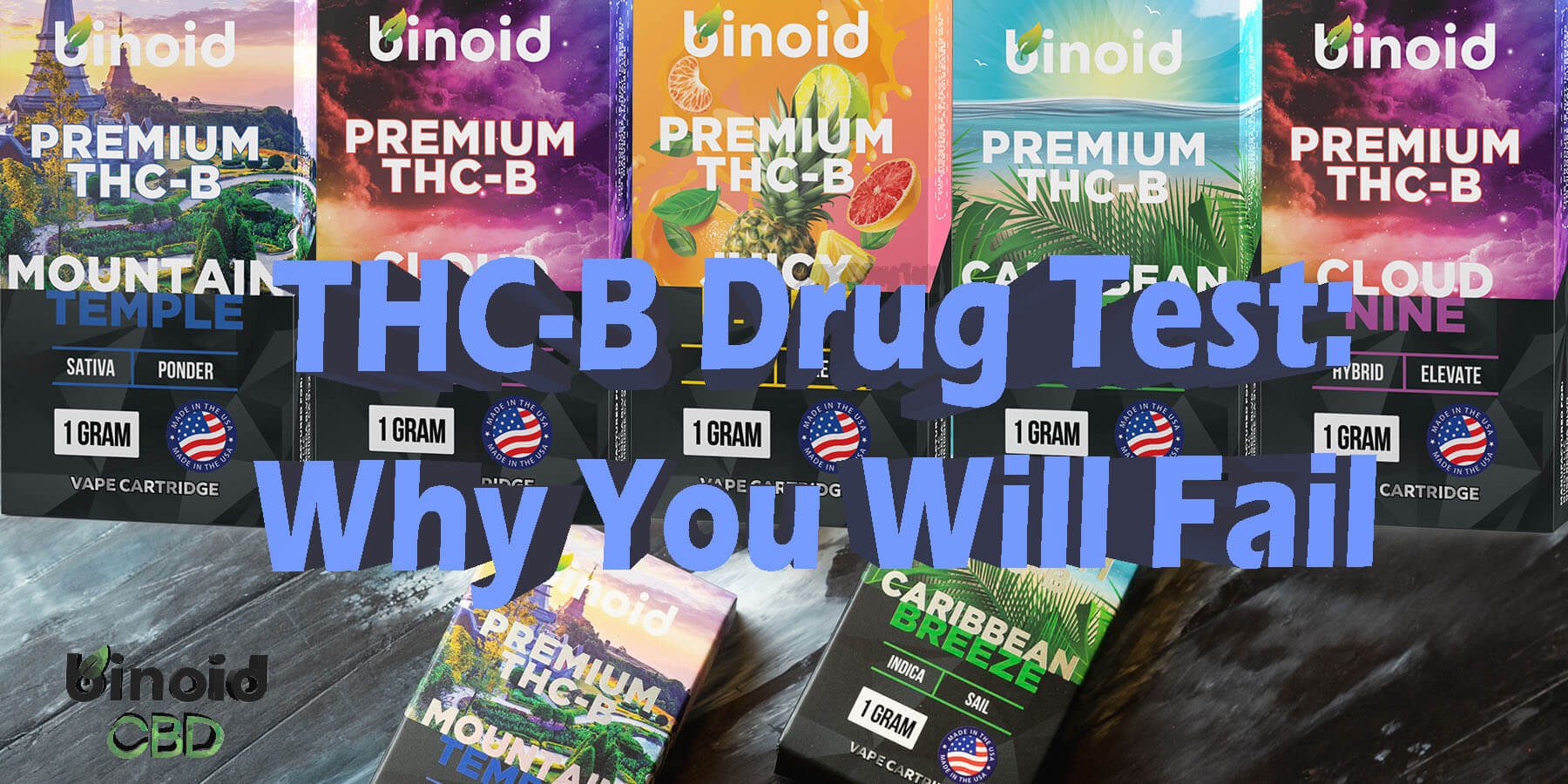Tetrahydrocannabutol (THC-B) is about to make it big on the hemp market, acting as the latest cannabinoid to captivate hemp enthusiasts with promises of a glorious high combined with plenty of other potential benefits. Discovered only in 2019, it’s a trace cannabinoid that we didn’t even know existed until very recently. There’s still a lot to learn about it, but one thing that people want to know now is whether or not it has any impact on a drug test.
We understand, a lot of people out there want to enjoy certain derivatives of the hemp plant but have to be particularly careful because they do get drug-tested, especially for work-related purposes. Let us tell you what we know about THC-B and its impact on drug-testing, so that you can hopefully make the best decision possible.
To Buy THC-B Products Click Here
-
Product on sale
 THC-B + HHC Gummies – Pink Lemonade (RELEASE SALE)$26.99
THC-B + HHC Gummies – Pink Lemonade (RELEASE SALE)$26.99$59.99 -
Product on sale
 THC-B Vape Cartridge – Cloud Nine$30.99
THC-B Vape Cartridge – Cloud Nine$30.99$59.99 -
Product on sale
 Super 7 Tincture – 7000mg$39.99
Super 7 Tincture – 7000mg$39.99$59.99
What Is THC-B?
Tetrahydrocannabutol (THC-B) is one of about 113 cannabinoids that naturally occurs in the hemp plant. An extremely trace cannabinoid, THC-B was discovered for the first time in late 2019. In fact, it was discovered along with tetrahydrocannabiphorol (THC-P) by a team of Italian researchers analyzing the chemical composition of the hemp plant through liquid chromatography. More on that in a little bit.
Because THC-B was only discovered a couple of years ago, it’s not surprising that there’s still a lot we have yet to learn about it. Remember, many other cannabinoids, including CBD, delta 8 THC, and delta 9 THC were discovered in the 1960s, giving us decades worth of research and clinical data to understand the exact nature of their effects on the human system.
Will Taking THC-B Cause A Failed Drug Test?
Let’s get straight to the point – tetrahydrocannabutol (THC-B) will very likely cause a person to fail their drug test. To understand why, we need to discuss how cannabinoids are processed by the body, and what drug tests are actually looking for.
THC-B is extremely similar, chemically speaking, to delta 9 THC. In fact, this is the case when it comes to any cannabinoid with the name “THC” in it. All THC compounds are metabolized in the body by an enzyme called THC-COOH. About a half hour after we consume a THC cannabinoid, 50% of it has already been metabolized. Another 30 minutes later, 25% more is metabolized. From there, the remaining 25% is metabolized by this enzyme, and this process can take days to weeks depending on the amount of the cannabinoid that’s in the body.
The thing is that drug tests aren’t looking for traces of marijuana in a person’s body. Instead, these tests are searching for THC-COOH, which is why consuming any THC compound will trigger a positive result.
Which Drug Tests Might Pick Up THC-B?
There are a number of drug tests that’re utilized for various purposes, and so having a better idea of the different drug tests that can be administered to you is no doubt essential. Below are the most common drug tests administered by either workplaces, law enforcement agencies, etc. here in the United States.
- Urine Tests: These are the most common tests used for employment and probation, and the most common type of at-home drug test as well. They’re very reliable in terms of results, offer a fast turnaround time and are affordable, not to mention minimally invasive. A urine test looks for THC-COOH in a person’s urine. Can show results from 2 to about 60 days after the last time it was taken, based on the concentration that was in the person’s body at the time the test was taken.
- Saliva Tests: Most commonly used by law enforcement, such as at traffic stops, to see if a person is driving while under the influence of an intoxicating substance. This type of drug test will display whether or not a person has used an intoxicating substance within the last 10 hours, since after about that duration of time, the substance is no longer detectable in the saliva.
- Hair Strand Tests: Can show whether or not a person has consumed certain substances, like THC products, within the last 90 days. These tests are extremely expensive and have a long turnaround time, which is why they’re not the most popular choice for employers. Hair strand tests are usually used under special circumstances. In fact, they’re more commonly used for autopsy purposes, to determine whether or not a person had certain substances in their system at the time of their death.
- Blood Tests: Only show whether or not a person is presently intoxicated, and these tests do not actually look for THC-COOH, but the compounds themselves. Blood tests therefore may or may not pick up THC-B – that’s just something that we don’t know yet, as we aren’t sure if THC-B and delta 9 THC are similar enough to one another to register as the same compound according to a blood test. Blood tests are most commonly used in hospital settings.
- Perspiration Tests: Mostly used for clinical trials, and simply aren’t used by employers. This type of test involves attaching a patch to a person’s skin, where it remains for two weeks, picking up their sweat over the period of time. THC-COOH can leave the body through sweat.
-
Product on sale
 THC-B + HHC Gummies – Blue Razz (RELEASE SALE)$26.99
THC-B + HHC Gummies – Blue Razz (RELEASE SALE)$26.99$59.99 -
Product on sale
 THC-B Tincture – 1000mg$30.99
THC-B Tincture – 1000mg$30.99$79.99 -
Product on sale
 THC-B Vape Cartridge – Caribbean Breeze$30.99
THC-B Vape Cartridge – Caribbean Breeze$30.99$59.99
Which Factors May Influence a THC-B Drug Test?
Let’s say you’ve already taken tetrahydrocannabutol (THC-B), and you just found out that you have a drug test coming up. There’s still a chance that you’re going to pass, even if you’ve consumed the cannabinoid recently. As you’re about to see, there are a few factors that influence what the outcome of the test will be.
#1: Your Prior THC-B Usage
Most of your likelihood of failing has to do with how you were taking THC-B. The more THC-B is in your system, the longer THC-COOH will linger in the body, in levels detectable enough to trigger a positive result. And, how much THC-B is in your system depends on a couple of things. One is the amount you were consuming. Basically, being a once-a-week THC-B user is different from being a daily user. Another thing is how much you were taking – say one puff of a THC-B vape per day compared to several vaping sessions consisting of many of puffs at a time.
The reason why these factors matter is that THC-COOH metabolizes THC-B at the same rate no matter how much is in the body. So, if you have a backup of the cannabinoid in the system, you’ll test positive for longer, because THC-COOH is still working on breaking down the amount that’s accumulated in your system. This is why you can test positive anywhere from a couple days to over a month after your last dosage, depending on how much was in your body.
#2: How You Metabolize THC-B
Some people just metabolize cannabinoids faster than others. For instance, there’s a link between the immune system and the rate at which the metabolism breaks down certain compounds. This is why when a person is sick, they may test positive for THC-COOH longer than when they’re healthy. Other factors include diet, exercise, hydration levels, and genetics.
#4: Potency of the THC-B Product
Some THC-B products come in specific milligram strengths, like gummies. Let’s say you have a once-a-day regimen with THC-B gummies. Eating a 5mg gummy daily is different from eating a 50mg gummy daily – of course, the stronger the milligram strength of the product, the more THC-B will accumulate in the body, increasing the window during which you can end up testing positive.
Where To Buy THC-B Products: Vape Carts, Tinctures, Disposables
You can find THC-B products such as vape carts, tinctures, disposables and more on Binoid’s website here! Or you can search “THC-B” at the top header of their website. Binoid carries THC-B vape carts such as Juicy Fruit, Cloud Nine, Caribbean Breeze, Mountain Temple and more such as indica or hybrid options. You can choose your regular THC favorites with our THC-B vape carts here.
Are There Ways to “Flush” THC-B Out of Your Body Before Getting Drug Tested?
Some people are hopeful that specific methods can rid the body of tetrahydrocannabutol (THC-B) preceding an upcoming drug test. Despite the fact that these methods are very popular, none of them have been shown to be highly effective.
- “Weed Detox” Products: These beverages contain strong concentrations of minerals and vitamins aimed at boosting the rate of metabolization, which would theoretically make THC metabolize more quickly.
- Cranberry Juice: Acts as a diuretic due to its effects on bladder health, and some people hope that drinking lots of it will cause them to urinate out the THC-COOH at a faster rate.
- Zinc: Some people have said that zinc supplements interfere with a drug test in a way that can yield a false negative.
- Water: Another method people have tried is consuming an excess of water, in hopes of diluting the THC-COOH in their urine to undetectable concentrations.
-
Product on sale
 THC-B Vape Cartridge – Mountain Temple$30.99
THC-B Vape Cartridge – Mountain Temple$30.99$59.99 -
Product on sale
 THC-B Vape Cartridge – Juicy Fruit$30.99
THC-B Vape Cartridge – Juicy Fruit$30.99$59.99 -
Product on sale
 THC-B Vape Cartridge – Cloud Nine$30.99
THC-B Vape Cartridge – Cloud Nine$30.99$59.99
What To Know About THC-B Before Testing
If you want to take your chances and use THC-B products despite knowing that you may be drug-tested in the relatively near future, there are some things to keep in mind first. One is that in the event that tetrahydrocannabutol does, in fact, trigger a positive result, your usage can make a difference.
Comparing it to THC, we see that those who only use marijuana once in a while can require 5 or so days before they test “clean”, while heavy users may need somewhere around a month of abstinence before THC-COOH is no longer detectable in their urine.
In other words, if you are worried that using tetrahydrocannabutol can cause a positive result, you might want to apply this information to your THC-B usage. In other words, consider when it’s time to take a break from using THC-B so that the potential levels of THC-COOH would no longer be traceable by the date of your test.
Also, there are cannabinoids that do likely trigger THC-COOH, and those are delta 8 THC, delta 10 THC, THC-O, and THC-P. Some hemp companies make products that combine THC-B with at least one of these cannabinoids, so taking them could cause you to fail a drug test, not because of the THC-B itself.
How Drug-Testing For THC-B Works
When a person takes a standard urine test for an employer or other type of organization, the test is not actually seeking to identify levels of THC in the body. Instead, it’s searching for THC-COOH – a type of metabolite that’s released into the body when a person consumes THC, in order to break it down. THC-COOH is fat-soluble, which means that it remains in the body for quite a while. This is why a person can test positive for several days up to weeks following THC usage.
Because standard drug tests are testing for a metabolite rather than a specific compound, this raises the question about how tests will respond to other cannabinoids. In other words, are there other compounds in hemp that cause the body to produce THC-COOH?
With THC-B Drug Testing – Just Play It Safe
Bottom line, tetrahydrocannabutol (THC-B), just like other hemp-derived cannabinoids, can cause you to fail a drug test. If you’re someone who has a drug test coming up soon, you will probably want to hold off on trying THC-B for that reason.
If you have taken THC-B recently only to find out that you have an upcoming test, the good news is that you still have a chance of passing depending on when you took the product last, how much you’ve taken, and how you metabolize cannabinoids. Still, overall, when it comes to THC cannabinoids and drug-testing, it’s better to be safe than sorry.
To Buy THC-B Products Click Here
-
Product on sale
 Super 7 UFS Disposable Vape – 7 Gram$63.99
Super 7 UFS Disposable Vape – 7 Gram$63.99$89.99 -
Product on sale
 THC-B + HHC Gummies – Mixed (RELEASE SALE)$26.99
THC-B + HHC Gummies – Mixed (RELEASE SALE)$26.99$59.99 -
Product on sale
 THC-B Vape Cartridge – Juicy Fruit$30.99
THC-B Vape Cartridge – Juicy Fruit$30.99$59.99


